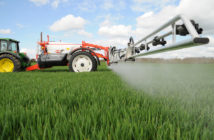The Lancet Oncology has published conclusions from the International Agency for Research on Cancer (IARC) that found five pesticides to be “possibly” or “probably” carcinogenic to humans.
The following is a statement from European Crop Protection Association Director General Jean-Charles Bocquet:
“The IARC conclusions published in Lancet Oncology contradict the world’s most robust and stringent regulatory systems – namely the European Union and the United States – in which crop protection products have undergone extensive reviews based on multi-year testing and in which active ingredients such as glyphosate and malathion been found not to present a carcinogenic risk to humans.”
“From the summary conclusions it appears that IARC has made its conclusions as a result of an incomplete data review that has omitted key evidence.”
“The IARC rating is based on the intrinsic properties of active substances and limited epidemiological evidence. Where the full evidence is taken into account – and the evaluation covers actual use – there is no proof that pesticides cause cancer in humans. This is clearly shown by several studies on farmers’ health. Farmers (who are the most exposed to pesticides) live longer and in better health than the rest of the population. Cancer incidence and mortality is lower in farming populations than in the rest of the population for all major types of cancer but skin cancers.”
“Europe’s crop protection industry will continue to work with regulators to ensure each and every product goes through the proper testing procedure and enters the market only when its safety has been assured.
Conclusions about a matter as important as human safety must be based on the highest quality science that adheres to internationally recognized standards. The IARC classification system is not aligned with current international regulations and the organization’s recent decisions create needless public concern.”
Nick von Westenholz, CEO of the Britain’s Crop Protection Association said: “It’s extremely surprising that the International Agency for Research on Cancer (IARC) has apparently disregarded a substantial body of scientific evidence supporting the conclusion that glyphosate is not a human health risk.
“Numerous health assessments conducted by public authorities over the past 40 years have consistently concluded that glyphosate does not pose any unacceptable risk to human health.
“As recently as last year, the German government, acting as Rapporteur Member State for the EU’s renewal of approval for glyphosate, found that in epidemiological studies in humans there was no evidence of carcinogenicity and there were no effects on fertility, reproduction and development of neurotoxicity that might be attributed to glyphosate.
“Claims that glyphosate is possibly carcinogenic also contradict conclusions reached by the IARC’s own parent body the World Health Organisation (WHO), which has found that ‘glyphosate is unlikely to pose a carcinogenic risk to humans’.
“Looking at the summary, the IARC’s conclusions appear to be the result of an incomplete data review that has omitted key evidence, and so needs to be treated with a significant degree of caution, particularly in light of the wealth of independent evidence demonstrating the safety of glyphosate.
“Pesticides are the most heavily regulated products in Europe, it currently takes around ten years, costing £150m, to bring an active ingredient to market. This regulatory process, involving rigorous scrutiny by independent scientific experts, ensures plant protection products are safe for consumer health, for the people who use them and for the environment.”



